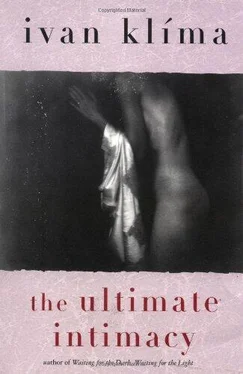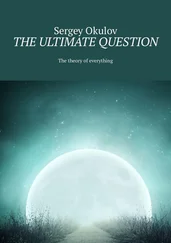Ivan Klima - The Ultimate Intimacy
Здесь есть возможность читать онлайн «Ivan Klima - The Ultimate Intimacy» весь текст электронной книги совершенно бесплатно (целиком полную версию без сокращений). В некоторых случаях можно слушать аудио, скачать через торрент в формате fb2 и присутствует краткое содержание. Год выпуска: 1998, Издательство: Grove Press, Жанр: Современная проза, на английском языке. Описание произведения, (предисловие) а так же отзывы посетителей доступны на портале библиотеки ЛибКат.
- Название:The Ultimate Intimacy
- Автор:
- Издательство:Grove Press
- Жанр:
- Год:1998
- ISBN:нет данных
- Рейтинг книги:3 / 5. Голосов: 1
-
Избранное:Добавить в избранное
- Отзывы:
-
Ваша оценка:
- 60
- 1
- 2
- 3
- 4
- 5
The Ultimate Intimacy: краткое содержание, описание и аннотация
Предлагаем к чтению аннотацию, описание, краткое содержание или предисловие (зависит от того, что написал сам автор книги «The Ultimate Intimacy»). Если вы не нашли необходимую информацию о книге — напишите в комментариях, мы постараемся отыскать её.
The Ultimate Intimacy — читать онлайн бесплатно полную книгу (весь текст) целиком
Ниже представлен текст книги, разбитый по страницам. Система сохранения места последней прочитанной страницы, позволяет с удобством читать онлайн бесплатно книгу «The Ultimate Intimacy», без необходимости каждый раз заново искать на чём Вы остановились. Поставьте закладку, и сможете в любой момент перейти на страницу, на которой закончили чтение.
Интервал:
Закладка:
Matous Volek is not in particularly good form. His appetite is not returning and his stomach hurts from time to time. He can't go to the pub or to any of the offices of the journals he works for. This is the third day he has been entirely alone and to cap it all it is Sunday morning and holy days have always depressed him. He spends a little while playing with the seven tangram dice but fails to build any interesting picture. So he tries to call up a number of friends but nobody answers the phone. They are probably at their weekend country places or at the seaside.
It's hot. Matouš gets up and puts on the big ceiling fan. The fan whines, which Matouš finds irritating, but at the same time its noise and the movement of the hot air remind him of cheap hotels in China or Singapore. He searches among his CDs for the one with Chinese music with its sense of the unusual that always soothes him. While listening to the 'Moon Mirrored in the Waters' he makes himself a pot of red tea and then goes to sit in the old armchair with its worn leather cover.
A white screen and behind it the lively gestures of the puppets. Gongs and Mongolian fiddles. Wooden clappers. The somersaults of the actors in their pure silk costumes. Wu-tan in a red robe and wielding a sword.
Pagodas in parks, the red walls of the Imperial Palace, gates with yellow roofs. The fish market and bicycles flashing past like a shoal of fish. Those under sentence of death being hauled off to execution on a cart; rebellious intellectuals and con men, smugglers, corrupt officials and murderers. The ever-curious crowd goggling at those who are about to die. When the crowd becomes enraged, it hurls books into the flames. Brainwashed children burn the works of old Chinese masters along with those of foreign devils, or goad an old man along: they thrust a four-sided hat on his head and hang a sign around his neck saying 'STINKING TEACHER CHANG PREACHING THE CAPITALIST ROAD'. They make him kneel before a portrait of Mao and recite from memory some of the dictators articles. Then they dance the Dance of Loyalty and hang a wall-poster of loyalty on the wall. They all sing The East is Red'; all in the name of some senseless, self-destructive revolution, all in a country where until recently the old were esteemed as nowhere else in the world.
The Yellow River and in it Mao, the fat, ugly and cruel unifier of the country. Even on the day before he died millions of brainwashed children and old people were shouting: May he live a thousand years!
How many years, how many months, how many days does Matouš have left? He would like to leave his burrow behind, leave behind the world of screeching tramcars, a world well-disposed to con men, loose women, cancer and bad poets, whose works mostly did not get burned, and find a place of silence wherein he would hear nothing but his own breathing. But the fan whines and the solitude presses on his brain and all he can see and hear are mindlessly roaring crowds.
If only his bad wife were to look in; she regularly drops by for money. It is two months since she was last here. She was probably too ashamed to come to the hospital, or else she knew he had no money there. But at this moment he would give her whatever she asked for, provided he had enough. Maybe she would make it up with him and stay till the end.
Matouš believes he is endowed with a special gift of perceiving the aura that surrounds every individual, so that at moments of clairvoyance he is able to discern when the aura is so weakened that the person no longer has enough strength to live. But he is incapable of seeing his own aura and this fact does not help his peace of mind.
He knows he ought to rise above all the cares that flow from his awareness of his own self, cut the umbilical cord that connects him to
the outside world. Instead of succumbing to anxiety, he ought to advance with equanimity towards the Great Coalescence. Except that he spent the whole of yesterday gawping at the television in order to dispel his loneliness, distract his thoughts and not miss what life had to offer for the brief moment that fate still granted him. But on Sunday mornings there are only children's programmes on television. So he pours himself a glass of wine and some lines of poetry come to him:
Drink wine, anyway, do nothing
Float away Fathomless longing.
In his stomach the wine is instantly transformed into boiling lead that rises back into his throat.
The eyes of a jade Buddha stare at him from the glass case opposite his bed. Oh, monks, this, then, is the noble truth about suffering: birth is suffering old age is suffering sickness is suffering, death is suffering, contact with unpleasant things is suffering when one does not attain what one wishes it is suffering. .
Suddenly he makes up his mind. It's Sunday, he'll go and hear the husband of that motherly matron preach. Maybe his sermon will cheer him up.
He enters the chapel after the service has started. The place seems half-empty to him. Perhaps it's always like this, or perhaps it's because the holidays are beginning. All the same, Matous does not sit down but stands behind the last row of pews trying to make out whether the pastor's wife is also in church.
Shortly after his own arrival, another woman enters. She is strikingly attired and her long hair with its faintly Titian red hue hangs halfway down her back. She stands alongside him, opens the hymnal and when she has found the hymn, joins in the chorus.
Matouš doesn't join in the singing; he doesn't know the melody and the text seems to him imbued with a belief in something he finds utterly foreign.
The pastor's wife is sitting right in the first row. He easily recognizes her plump figure and the slightly greying hair which, instead of being
hidden under a nurses cap, is combed up high into a bun. Matouš s mother wore her hair the same way.
The pastor is too tall and gaunt and it seems to Matouš that there is something ascetic about his appearance, or maybe something intense. He emphasizes each of the words he now reads from the Scripture as though wanting to attest that each word was a stone in a foundation or an unshakeable rock. Do not lay up for yourselves treasures on earth, where moth and rust consume and where thieves break in and steal, but lay up for yourselves treasures in heaven, where neither moth nor rust consumes and where thieves do not break in and steal. For where your treasure is, there will your heart be also.
It's interesting that even in those far-off times people didn't have anywhere to hide their treasures from thieves. Confucius also lived in a time of wars, discord and crime, but believed that in some earlier age harmony, justice and wisdom had reigned, and we must return to those values if we wish to remedy the way things are.
The pastor continues with his reading. The text emphasizes that people should not worry about their future or fear that they will have nothing to eat or wear. Then the minister starts to interpret the text. In his opinion, people have become plunderers, always wanting to own something. Nothing of what they already have seems enough to them and in a way they turn into bandits, taking where they can, plundering anything that cannot protect itself, whether it be someone weak and helpless, an animal, a tree, any living thing. They even plunder the dead resources of the earth and transform them into enormous quantities of things which soon turn into piles of waste.
Matouš senses agitation welling up from within him. It is a state he is familiar with. Sometimes he can engender it when he has drunk several pots of strong green tea. At such moments, objects start to become transparent; plants and all living things become surrounded with an aura of gentle colours and he is able to discern the traces of past contacts and the outline of imminent death, decay and putrefaction. And at that moment he realizes that the pastor's aura is fading; it appears and then disappears like the twinkling light of a distant star. The pastor has not long to live. Maybe he suspects as much; Matouš can detect nervous anxiety in his words. It is also odd that whenever the pastor looks towards the place where Matouš is standing, his speech seems to falter and it is as if he has lost his thread. Only when he turns away does he continue with possibly even greater emphasis.
Читать дальшеИнтервал:
Закладка:
Похожие книги на «The Ultimate Intimacy»
Представляем Вашему вниманию похожие книги на «The Ultimate Intimacy» списком для выбора. Мы отобрали схожую по названию и смыслу литературу в надежде предоставить читателям больше вариантов отыскать новые, интересные, ещё непрочитанные произведения.
Обсуждение, отзывы о книге «The Ultimate Intimacy» и просто собственные мнения читателей. Оставьте ваши комментарии, напишите, что Вы думаете о произведении, его смысле или главных героях. Укажите что конкретно понравилось, а что нет, и почему Вы так считаете.






![Theresa Cheung - The Dream Dictionary from A to Z [Revised edition] - The Ultimate A–Z to Interpret the Secrets of Your Dreams](/books/692092/theresa-cheung-the-dream-dictionary-from-a-to-z-r-thumb.webp)





